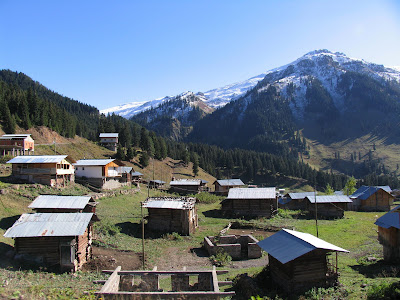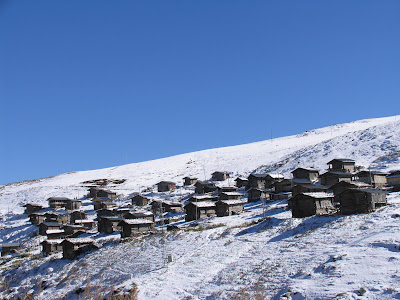The road goes near the shore of the Euphrates River, in another of the Silk Road; the ground turned dry and arid, we saw the first "tents" of the Bedouin, nomadic people that lives of the cattle, without a fixed place to live.
The last days have been very comfortable, and to arrive Al Thaura in a windy, and rainy day without place to sleep, it was... But, it is good that always something happen; we bought some peanuts in a shop, and they invited us to have tea; once it happens this, the food and the accommodation is the following. We have talked a lot about the Turkish hospitality, but the Arabs... is too much; we couldn’t eat or drink everything that they gave us, it’s too much!, they treated us as kings, giving us an apartment in the city only for us, inviting us to dine with the family... they even went to find a computer I don’t know where, just to connect internet for us; for them everything of this, is normal; we don’t find the words to thank them for it…

María had the opportunity of stay with the women at the house of Tayssir, where they dress normal clothes, and have the hair uncovered; with the arrival of the men it was a big commotion in the entire house, to put on the long clothes and the scarf on the hair.
The following morning Nadim wake us up with the breakfast, nor in the best hotel... We went by hitchhike to a nearby castle, Qala'at Ja'abar, settled on the shore of the lake that forms the dam of the river; but in the desert it is very complicated to travel like this, arrive, we arrived, but we had to walk a lot of kilometers until we found some vehicle; and the transports that pick us up are usually pick up, which bring us in the towage.

We went into the desert traveling by our way, something that the people cannot understand here for the low prices of the transports. We found a small traditional village, where we were observed and pursue by the children. The night was falling and a truck stopped to take us; avoiding flocks of sheep we found the ruins of Halabiyeh where we pass a very cold night between shouts of bats and barking of dogs.
The next day, it was the same, nobody passes with a car and we had to walk a lot. But on the way we had a nice experience; some Bedouin called us to have tea and to eat corn; real Bedouin people!, with their traditional clothes, the women with the tattoos on the face... We only could speak with “hand language”, but we understood perfectly that next time we don’t need to sleep outside, when we have a place here.


The veterinarian of the area approached us up to Tibni, and we received a new offer of tea, but this time for somebody of the government in the Cultural House. We accepted, but during the tea, a policeman came and started to ask us questions as: -have you been in Israel?, finally he asked us for the passports, and started to note things. At first we refuse to give the passport, but we thought clear and we didn’t want to be retained again, as soon as they returned them to us we went out very quick.
The people always insist on stop buses for us, this time was another policeman, and from the beginning we told him a story…”this is very important project, we cannot take buses, strictly by hitchhike…” after one hour helping us to stop a vehicle (nobody passes), he pay a bus for us and we went direct to Deir Al Zor. Seeing the difficulty of hitchhike here, we took a bus straight to Palmyra where all around turned pure and hard desert.
Palmyra is the emblematic place of Syria, Roman ruins from between the 2nd and 3rd centuries A.D., and where they have built a small town special for tourist, a corrupted place, very far of the authentic Arab life, a place where all the vehicles are taxi, where everybody have hotel; the people don’t ask, harasses; nobody helps you if there is not "money, money" first. We avoid the people, and we settle between the ruins and the castle; we pass the night into some ruins that we think are old tombs, because in both sides there were like six cavities to put the bodies. We were lucky to find this place, the nights in the deserts we knew that are cold, but really is too cold because the temperature fell up to about 3 degrees below zero.






After several days sleeping outside and carrying with the house on the back, we are very tired, so we decided to take a bus to Homs; but in the bus station, first they asked us for four tickets, for the backpacks too; after that they asked for a high price bus ticket with that look of "money, money"; we bargain, but as they were laughing, we left; we put the hand up to the first truck that passes and he brought us very happy. With him we went up to Homs, and on the way he invited us to coffee, fruit... but we hallucinate when talking about the PKK, he took a gun to explain us with gestures that indeed there are a lot of problems in Turkey with the terrorist group.
In Homs, we were harassed by the taxi drivers again, all of them wanted to take us and they trick us with the distances, and they bargain their self bringing the prices down. And from Homs, to the north we found Hama. Here we had to look for something to sleep, we were so tired, anyway, the pocket not even notices it, with a hotel for 6 €.
Hama is the city of the water wheels; there is a sort of river that crosses the city, a contaminated river of corrupted water; but along it, is find these old wooden wheels, which give a special touch to the city.




The cheap transport is a very great temptation, but more is the temptation of the adventure and experiences. We left the city on foot, and it is not necessary to hitchhike, we only need to lift the hand a little, and the one that passes, the one who stops. First it was a truck and afterwards a very cute couple from Palestine, they told us that they had left their country and were going to be married in Turkey, because their families didn’t want to see them together. They left us in Ma'arrat an Nu'man and we cross the town looking for the road to Kafr Nobbol. Again we have offers of having tea, or smoke Narghile... we accepted in a car garage shop with the workers, they gave us tea and myrrh, a sort of very strong coffee that is served in very few quantity and is taken of a gulp.
We found the good road and a van approached us up to Kafr Nobbol where we met Rami, of CS. He and his friends took us by car to see the "Dead Cities", ancient neglected towns, built whole of stone. In the most important of them, Serdjilla, we saw two "ancient factories" of olive oil, totally built with stone.






The guys talked to us a little about how the life works here; for example what is normal is that the parents choose the couple of the children and agree on a meeting, afterwards they have a period of time to see whether it works; but the parents really have the last word. During the lunchtime we don’t remember the last time that we used cutlery, we always eat on the floor, using the bread as spoon, very different, and tasty...
Chances of the life, we went back to Aleppo... and we spent one night at the house of Rami’s sister. On the way we stopped in Ebla, a very important place in the history, but only remain that, history and stones...

We decided to leave by train up to Latakia, because the way is very nice, among the only mountains that Syria has, besides it is very cheap, 3 hours of journey for 1 € both tickets...
The liars taxi driver told us that the city centre is too far, to which we arrive in 10 minutes on foot. Latakia is very different to the rest of Syria, not all the women go covered up, is a lot less traditional; as Bani, the guy of HC, with a European mentality. He took us to his house in the mountains, where we pass 4 days of storms, rain... the lightnings falling just in front of the house, something very impressive. They were some disconnect days of the world, which have been very good to stop a little our travel, besides with the peculiar way of life of Bani we learned so much, we went to places hidden among the undergrowth, making bonfire... it was sad that we couldn’t see the fauna here, anyway we listened to the jackals and the hyenas at night.


We make use of the first sunny days, and we went towards the south by the coast, and again towards Homs stopping on the way to see one of the best preserved castles, a castle very important during the Crusades, the “Crac des Chevarlies”. The fort is very, very well preserved and we could pass days investigating its tunnels and secret doors.



Up to Maalula, we went by hitchhike, a town excavated and build in the mountain. The place is sacred for the Christians; mosques and churches are seen here sharing ground, and its inhabitants keep the tradition of speak in Aramaic. The night that we arrived we found a hollow among the rocks that it served to us to shelter in these cold nights.














































